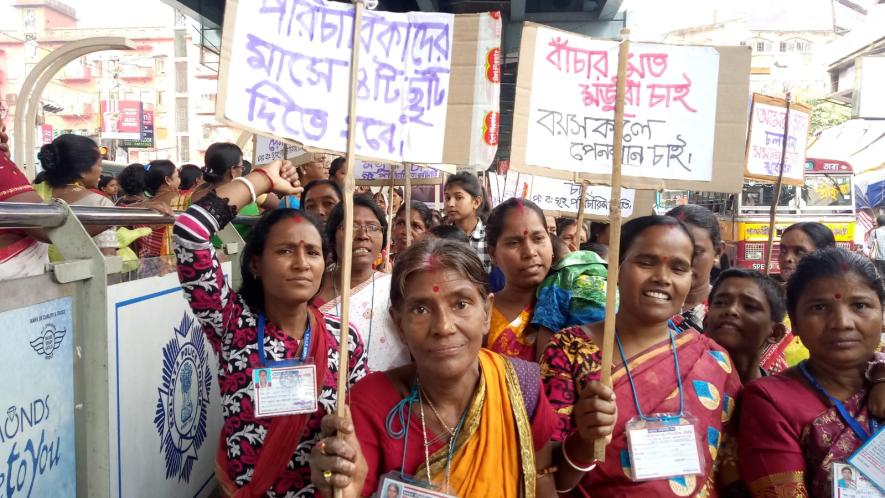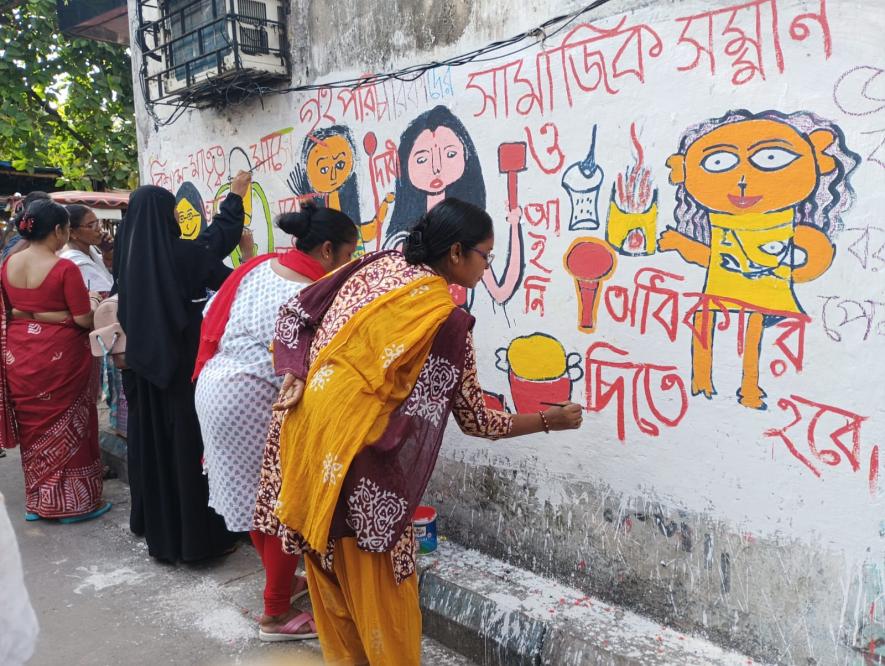Bengal: Domestic Workers’ Unions Growing Strong, Yet Fight for Rights, Recognition Goes on

Kolkata: “We have knocked the government’s doors umpteen times, but they remained shut,” Pritha Ta, dejected organiser of the domestic workers union, Paschimbanga Griha Sahayika Union, affiliated with the Centre of Indian Trade Unions (CITU), told NewsClick, about the pending registration of their union.
On International Domestic Workers’ Day on June 16, narrating her hard work in organising this union, Pritha said she leaves at 4 a.m every day from the Jadvapur rail station to catch the first train for Garia station. During the train journey, she reaches out to domestic workers travelling to the city of Kolkata and its southern suburbs, some from far- flung areas of 24 Parganas district.
Though the union is not registered with the state government’s labour department, many domestic workers have become members. Their life, their daily struggle despite the apathy of their middle-class employers, inspires us,” she said.
A Climate Refugee-Turned Domestic Worker’s Struggle
Mamoni Goldar, 46, was leading a quiet village life when Cyclone Aila destroyed their house at Patharpratima’s Kenarampur, After the cyclone, the family moved to Kolkata as climate refugees. Now a resident of Anandapur area on the south-eastern fringes of Kolkata, she toils hard to make ends meet. She said she often faces the issue of no dignity of labour in her workplace. Recently, a legal baron threw her out of her house in Kolkata’s upscale Urbana Complex and did not paying her due wages of Rs 14,000. The police, and even her union, could not do anything due to the clout of the legal baron.
Mamoni belongs to the Paschimbanga Griha Paricharika Samity, the only government-registered domestic workers’ union in West Bengal and is a state committee member of that organisation. Her son is without work and is unemployed, while her husband suffered is incapacitated after an accident. “I had to spend Rs 1.5 lakh for his (husband’s) operation after the accident damaged one of his knees. Though we cannot manage to win always, but our union has shown us the way of waging a collective fight,” she told NewsClick. Labour rights activist Naba Dutta is the founder of this union, which boasts a membership of more than 10,000 domestic workers.
Another ‘climate refugee’ is Swapna Tripathy, an ardent organiser of the registered union whose house in Patharpratima’s Digambarpur was destroyed time and again by cyclones Aila, Amphan and Yass. She had to spend nights in railway stations, and during the Covid pandemic, for one month, some slum dwellers took the responsibility of supplying food to her in Dhakuria of Kolkata. These slum dwellers respect her for her organisational skills and dedication. An effective public speaker, she told Newsclick about the various workplace hazards and the demands of all the major unions in this sector, which are struggling to get recognition as ‘workers’ in the labour department’s eyes.
Over 22 lakh domestic workers in West Bengal are registered in the eShram portal of the Central government. But, only a miniscule number among them are unionised. Yet, collaboratively, the unions have managed to send ripples in the state, voicing their demands for fair wages, the right of using toilets in their workplaces, getting insurance backup, and social security extended to the informal sector.
The CITU-affiliated union has a five-point demand charter, seeking Rs 75 per hour as pay, a weekly off, constitution of state welfare board for domestic workers, photo IDs with names for domestic workers, pension after the age of 55 @ of Rs 3,000 a month and social security network for domestic workers in Bengal.
Swapna Tripathy, on behalf of the registered union, and Pritha of CITU-affiliated union, demanded that the International Labour Organisation’s Convention 189 and the Social Security Network Act of 2008 has provided for a specific law for domestic workers of the country. But the law is not implemented in most states.
Tripathy pointed out that Kerala, under the Left Democratic Front government, has provided for minimum wage, pension and other amenities and has accorded the domestic workers the status of a worker. Similarly, Tamil Nadu, Karnataka, Andhra Pradesh and Rajasthan, too, had taken proactive steps in the regard, which are missing in West Bengal.
Ashok Ghosh, general secretary of United Trade Union Congress or UTUC, who mentors the registered union, told NewsClick that the state government was yet to finalise a policy for domestic workers and accord them the worker status. “This is pathetic. Similarly the demands of maternity benefits, ESI 9Employee State Insurance) privileges for domestic workers are fair demands, which are not being heeded by the state government. The fight has started. In the coming years, more women domestic workers will be unionized to collectively raise these demands”, he added.
Dipannita Mondal, 39 and Ashima Baidya, 23, begin their day at 3:30 a.m in their village near Taldi in West Bengal’s South 24 Parganas district. They prepare food for their families and rush to the railway station by 4:45 a.m to catch the popular “domestic workers’ local to Sealdah from Canning.

The sheer number of domestic workers who commute daily to Kolkata by these two trains from Canning and Laxmikantapur has led to these trains being locally referred to as ‘Jhi Special’ (the term ‘jhi’ refers to domestic workers in Bengal, even though originally the word was used to denote any young girl until the 1950s). Every morning, thousands of women pour into Kolkata in these jam-packed trains to earn their livelihood as domestic workers in and around the city.
However, the Covid-19 pandemic upturned their lives. During the first wave, several of them were forced to pawn their jewellery to survive, as the train services were halted owing to lockdown restrictions.
For Reena Mondal, 29, a mother of a teenage daughter, a life of strenuous work began when she became a mother at the age of 16 after marriage at the age of 15, when she was a minor. Her daughter is 13 years old now. She works as a domestic worker (washing clothes, utensils, and household cleaning) that starts at 5 a.m. She has to reach the first home where she starts work at 6 a.m, and then one by one, she goes to eight houses to work as a jhi. She earns only about Rs 9,000 a month.
The plight of Asma Bibi, 42, is more pathetic. To get work in Hindu households, she has to hide her Muslim identity. She has bought a shakha and a set of red pala (bangles worn by married Hindu women) that she wears while travelling to work in the train. She has taken on the name of Deepa Das to get work in Hindu households. Talking to Newsclick, she said it was easy for an elderly woman to hide her identity, feigning to be a Hindu widow, but she preferred to wear shakha and pala rather than pretend to be a widow, as her husband was alive.
“So far, the unions have not been able to approach Asma or Reena. However, with the union strength increasing every day, soon we will able to end the torment of domestic workers”, a determined Pritha said.
Get the latest reports & analysis with people's perspective on Protests, movements & deep analytical videos, discussions of the current affairs in your Telegram app. Subscribe to NewsClick's Telegram channel & get Real-Time updates on stories, as they get published on our website.
























